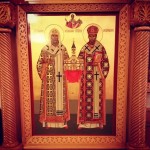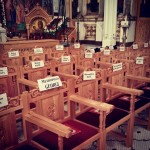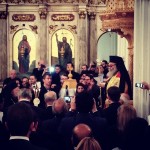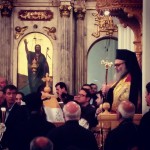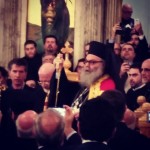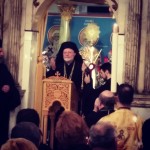On Saturday, December 6, St. Paul’s pastor Fr. Andrew Stephen Damick attended the enthronement services of the newly-elected Metropolitan Joseph, which were presided over by Patriarch John X of Antioch. Also in attendance were other St. Paul’s faithful and many hundreds of the clergy and faithful from through the Archdiocese, as well as most of the Metropolitans of the Holy Synod of Antioch and many other bishops.
St. Paul’s Parishioners Meet Patriarch John X of Antioch
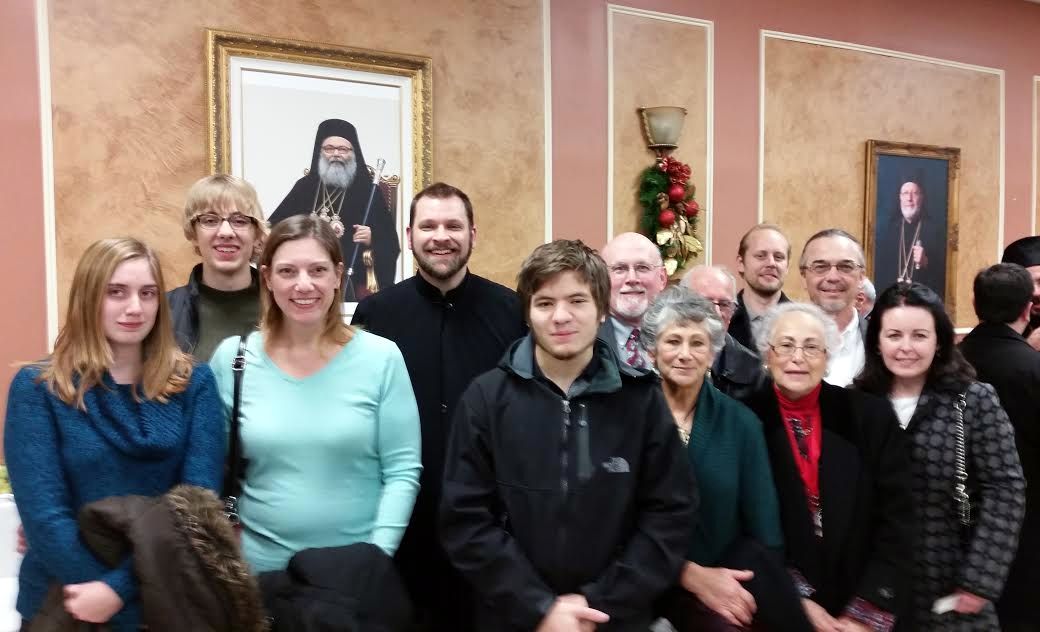
On Wednesday, December 10, 2014, twelve of the faithful from St. Paul’s traveled to St. George Antiochian Orthodox Church in Little Falls, New Jersey, to attend Vespers and a reception following. St. Paul’s pastor Fr. Andrew concelebrated the Vespers service with other clergy, which was presided over by His Beatitude, Patriarch John X of Antioch and All the East.
At the completion of Vespers, a gift icon was given by the local parish to the patriarch, and speeches were made by His Beatitude, along with His Eminence, Metropolitan Joseph and the local pastor, the Archpriest Dmitri Darwich.
At the reception, all those gathered individually received the blessing of the Patriarch and Metropolitan and spoke with them briefly.
Pascha 2013 Message of Patriarch JOHN X

JOHN X
Patriarch of Antioch and all the East
To all our beloved in the Lord
the children of the Antiochian See, clergy and laypersons,
On the great day of Resurrection, on which Christ rose and raised us with Him, it pleases me to remember with you the meanings of Resurrection and to explain some of its aspects.
The resurrection of the Lord is the resurrection of each one of us. In the resurrection the power of the devil, our enemy, was brought to naught. Although death terrifies human beings, yet the Lord Jesus has defeated it with his life-giving resurrection. He descended in His death to the abode of death, that is, to Hades, and exploded it from within, abolishing its effects. It is true that death is still there, however it has become a mere passage to true life, a complete liberation from temporal things and a way to eternity. Resurrection gave us grace instead of sin, immortality instead of corruption, life instead of death. The rule of the evil one is gone and the kingdom of God has appeared. Darkness gives way to light.
The resurrection is a new creation, a new man, a new people. It is a proof of the power of life and the energy of renewal. It is the supremacy of light and the everlasting rule of truth “If anyone is in Christ, he is a new creature; the old things passed away; behold, new things have come” (2 Cor 5: 17). The resurrection is the victory of God over the powers of sin and death which distort creation and humankind and seek to destroy them. It is the victory which inspired the Apostle Paul to proclaim: “Oh Death, where is your victory? Oh Death, where is your sting” (1 Cor 15: 55).
In His resurrection Christ has opened to man the way of true life, the life of happiness, light, love and renewal. In His resurrection Christ renewed our old nature, and made it in the beauty of His image, enabling us to become a people of resurrection in word and deed. If we believe and truly desire it then the resurrection of Christ becomes our own personal Pascha. “Christ is buried in us as in a tomb. He unites Himself with us and raises us again in Himself.” (Saint Simeon the New Theologian) When we become pure vessels for the Holy Spirit, our celebration of Pascha becomes a continuous celebration and “happens in us mysteriously at all times”.
True resurrection is never separated from the Cross. The Cross is the way that leads to it. The resurrection of the Lord cannot be lived without remembering His cross and carrying it. In order for us to participate personally in the resurrection of the Lord we must not forget the Cross which preceded it. Without the cross we cannot have a share in the glory of the risen Christ. If we are not aware of the Cross in our lives, from what will we be risen then? If we remain where we are now, where then are the signs of our resurrection? If the darkness of sin continues to prevail in us, how can the light of resurrection dwell in us? We cannot celebrate the resurrection of Christ if the light of the Savior does not fully dispel from our souls the darkness of our sins. Easter visits us now while our concerns increase, our fears grow greater, destruction expands, evil intensifies and killing is everywhere and at all times. How can we celebrate the resurrection while our country is doomed, the number of hungry and displaced people is increasing? How can we live the resurrection when the cross is always present?
This is the mystery of Christ, “Through the cross joy came to the whole world”. There, where the Cross is, true resurrection is to found too. Otherwise Pascha would only be mere poetry and chanting. The world does not like the cross. It seeks to abolish it, while it is surrounded by crosses on all sides. True believers would never have these crosses out of sight; they face them with the spirit of resurrection and take from them the new life and put on them the clothes of the light of life. The energy of the resurrection which is in Christ transforms the cross into a tool of joy, a way of life, a witness of love and a sign of communion and solidarity.
How can we live the resurrection? How can we embody it in our lives? How can we translate it from books to the reality of our life?
We celebrate the resurrection and live it when we do not allow evil to enter us and dwell within us under any circumstances whatsoever. We live the resurrection when we do not answer evil with evil. We live it when we continuously purify ourselves from all traces of hatred and rancour. We live it when we stick with constructive truth which does not separate but gathers, which does not cause grief but happiness, and which does not destroy but builds. Let us behold then the truth to which we were called, (if we know it), the truth which liberates us from all sorts of chains of evil. Let us behold the truth which is in the others and respect it, so we might truly communicate with our fellow citizens and fulfill each other, in order to build both our homeland and humanity.
Beloved,
What we are saying about Cross and resurrection takes on today a deeper realistic meaning as some of our brethren have suffered the troubles connected to the painful events we are witnessing. Our brothers, that is a number of Metropolitans, Priests and lay persons are still being held by their kidnappers. A number of priests and lay persons have been killed here and there, and thousands of believers have been displaced from their homes. We are carrying the cross of what all of them have suffered and are still suffering. We share the grief and the tragedy of the Archdiocese of Aleppo, as well as every parish. However, we should use this grief to make a way to a greater steadfastness and an occasion to proclaim our faith in the Resurrection. We have made until today every effort with international and local authorities, asking them to help in the release of the kidnapped. This is the least of what we could do. We need to work for peace to prevail in our regions and we call for an immediate cessation of violence in actions between fellow citizens. We will not surrender to these circumstances as the Lord did not succumb on the way to Golgotha. We shall continue in our way and we shall always claim the rights of man to a decent and peaceful life, mindful that the resurrection is certainly going to happen. For these reason I call upon you for more unity, more prayer, more steadfastness in your faith, more love for your homeland and more openness toward your fellow citizens. Only then can we be more powerful and more efficient in asking for the removal of oppression, a safe return of the kidnapped and the removal of every tear from the faces of those who are sad.
We become children of the Resurrection when we become bridges of communication and encounter between those who are separated, and between those who are in conflict. Let us be bridges exactly like the Lord who did not ask anything for Himself, but gave the world everything, to such an extent that He offered Himself for the salvation of the world. Let us serve as ways of rapprochement for all. Through love, sacrifice and in deeds and truth we shall build our countries.
We become children of Resurrection when we live our faith in genuineness, depth and meaningfulness. External expressions are bound to change with cultures and ways of living, but the genuine Christian content preserves the trust which has been handed down to the saints under many different circumstances, cases and cultures. Let us imitate the courage of Christ who did not fear anything, even death. Instead He faced the cross with love and brought us to resurrection. Let us face the cross of this crucified East with overwhelming love for all those who are crucified on it, until we reach with them the resurrection we all expect. Let us live these painful days in simplicity, enjoying the bare necessities of life and experiencing the true wealth which is life with God. Let solidarity, cooperation and communion be for us a priority. Needy persons are numerous and the numbers of those affected by troubles are increasing. Let us all be one family and one household. Let us not forget the words of the Gospel, “and whoever… gives one of these little ones a cup of cold water to drink… he shall not lose his reward” (Matt 10:42).
At this stage I address our children in the diaspora wishing them blessed days and praying for their welfare and that they may receive the blessings of God, reminding them of their role and the necessity of expressing their love toward their peoples and countries and in their communion with them. You can extend to us a helpful hand in any way that would be suitable for you.
Last but not least, we do not forget that God is the Lord of history, so we may always hold to patience and hope which do not fade away. Let us remember the words of the prophets and how much they called, in times of distress, for repentance and faith, until God intervenes and removes the distress. In these troubled days we are witnessing, we are in sore need of faithful witnesses. Let us move out of our distress with more faith, more purity and greater loyalty. When we understand that we only need God and no one else, the effects of resurrection will appear in us and in all our humanity. When this happens all around us shall be transfigured.
Christ is risen!
Indeed, He is risen!
First Pastoral Letter from Patriarch JOHN X: Vision for the Patriarchate of Antioch
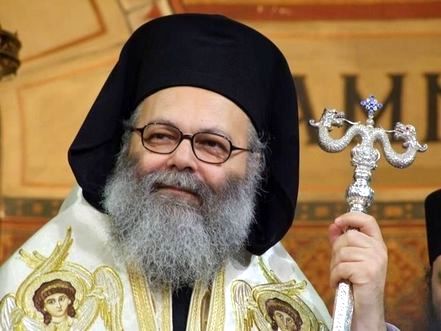
The following pastoral letter was distributed on February 17, 2013, after the enthronement celebrations for Patriarch JOHN X. What follows is the official English translation, taken from the Notes on Arab Orthodoxy website.
In service we transcend
And in love the structure is strengthened
With the Mercy of God
JOHN X
Greek Orthodox Patriarch of Antioch and all the East
To all our beloved in the Lord
The Children of the Holy Antiochian See
Clergy and lay people
“Having been built on the foundation of the Apostles and Prophets, Christ Jesus Himself being the cornerstone, in whom the whole structure is strengthened, and will grow into a holy temple in the Lord” (Eph 2: 20-2 1 ).
Beloved,
It is a pleasure to address you through this message, hoping that it conveys to you some of my concerns as to what our Church needs today and what is demanded of each of us. I would like to resort to these words, “In grace we grow, in service we transcend, and in love the structure is strengthened”, as a motto for my Patriarchate, as God has willed that I will be watching over the Antiochian Church and embracing its children with the help of my brothers the bishops. The Church is the Church of all of us. God has willed that we are in it as brethren, in order to work as one body. I know that many of you complain because they do not hear enough the voice of their Church. They think that it has abandoned them, and that it does not care for their real problems. Others, on the other hand, complain about the fact that many do not care about their Church, and are not interested in its affairs. I understand this complaint, and I am saddened by anyone who would forsake the flock of Christ because of negligence, arrogance, laziness or lack of transparency or care. It is my sincere wish that we should all share equally the responsibility for our Church, as Chrysostom has taught us. We will be responsible for it, if we respect our gifts and if we collaborate in caring for the affairs of our family as a whole.
For a person to take care of the affairs of his family, he should get acquainted with its situation, and should hope that the family itself knows his concerns and his constraints. We should therefore come up with diverse tools and measures that could make each of us listen to the other before we start preaching and planning.
Our Church has achieved in the previous era, through the efforts and sacrifices of my late predecessor Patriarch Ignatius IV and of the metropolitans of the Antiochian See, major accomplishments. With the help of the Holy Spirit these achievements can be continued with the assistance of devoted brethren. These achievements are now in our hands. We need to strengthen them, to develop them, and to render through them service to all our children and brethren and to all those who share with us this precious land of ours.
We hope to give each and every one the chance to express his opinion and to present constructive proposals, that may free our Church, with consultation, cooperation and efficient participation, from all weaknesses and impurities that it may become what its Lord and Master wanted it to be -a mirror of his glorious face. Then, through the ministry of the Church, through its humility and the cooperation of its children and their visitation in Love and conscious pastoral care, the world shall know that its Lord loves it so much, in spite of the hurdles and obstacles of the current situation.
The Pastoral Letter is a first step in a long journey for us together watching always over the common work and on how we can employ our capabilities for the service of all, for the service of this society, in which God has wanted us to witness for Him and for His love. You will find in it the main guidelines which I would like to lay before your eyes in order to straighten what has gone wrong in our life, and to strengthen what has been good in this Church which Jesus has entrusted to us that it may become the conscience of the world. These are common lines and headings. We shall work together on elaborating them, hoping to translate them soon to a plan of action, for the glory of the Lord and for consolidating our mutual love
1-Preaching:
The Lord said, “for this I was born, and for this I have come, to witness to the truth” (John 18: 37). He also said to us, “you shall be my witnesses” (Acts 1 :8). We witness to the truth, the truth which is Jesus Christ Himself, to Whom we witness by keeping His commandments, as He said, “whoever loves me, keeps my commandments” (John 14:23) Preaching is the backbone of the mission of the Church and the essence of its identity. This means the Church should carry the Word to all of humanity with the view of reviving it.
Preaching and ministering for the Word cannot be achieved by returning to old things, nor by clinging to a glorious past, nor by holding to an external tradition which is no longer of value. They are achieved and they become a reality to the extent they participate in the divine grace and live the tradition in a living dynamic way. We should think seriously how the Church can be heard in an age which boasts of its knowledge and material achievements, how the Church can dialogue with people, how to invite them to salvation, and how it can strengthen those who have believed in the mystery of their salvation.
In order for a Christian to accomplish his mission inside society, he needs first to accept and love this society, even if it contains dangerous trends, even if it is corrupt and evil, and even if its values conflict with the Christian conscience.
We should express the truth of our faith and our ministry of the Word in contemporaneous language resorting to technologies, without being estranged from our children and societies. It is important to use modern platforms to preach the Word. These platforms have transformed the wide world into a small village, by abolishing geographical boundaries and removing the obstacles between cultures. Modern media can help bring the Gospel to the people, as they can alienate them from it. Yes, we can use the media to reach millions of human beings who listen to them. The new media technologies have filled our homes and occupied the largest part of our children’s minds. We shall work with specialists and establish a specialized media center to put the media in the service of the Word. The center shall follow the example of the Apostle Peter in his speech on Pentecost, emphasizing openness, dialogue, and communication. We are invited to adopt a media policy that is centered not around ourselves but around God’s love to the world; this love was preached by the angels that peace may come from above.
We should affirm our identity within many identities, and we should raise our voice in the midst of many voices. The Holy Spirit dwells in the Church according to the Promise of Christ (John 14: 17), and works continuously in it, giving its members the gifts of Pentecost and its experiences. Therefore, we have to offer the experiences of sanctity and knowledge together without conflict or separation, in order for the Church to achieve its educational and informative role for the service of the believers and their spiritual growth.
Transmitting the Gospel to children and to the youth is a challenge that necessitates a great deal of awareness and effort. Through cultural centers and Church clubs, through printed and electronic publications, through traditional tools and modern communication and media facilities, we can accomplish our educational task and our ministry of the Word in all Church activities. We can also promote dialogue between members of the Church and between them and others. These technologies, despite some negative aspects in them, can play an efficient role in contributing to the good of human beings. Thus, we offer our children and the world a spiritual renewal, and bring the good tidings, as much as we can, to every human being, according to the saying of the Bible “Their call has gone out throughout the earth, and their utterances have reached to the end of the world” (Ps 19- 4).
This spiritual renewal leads us not to undermine the value of science, arts, literature, and all cultural aspects; we believe that the spiritual experience takes all knowledge to its sublime end in order to achieve its ultimate good. For God has loved the world, He loved it as it was, and will love it as it is now. We, as children of God, should love the world and take care of it, and perform our ministry of the Word by using all tools at our disposal.
2-The Service of Praising:
“Speaking to one another in psalms and hymns and spiritual songs, singing and making melody with your heart to the Lord” (Eph 5 19).
Liturgy, as the address of the created to the Creator; is the domain in which our Holy Fathers expressed the special relationship of the children with their heavenly Father; and the uprightness of their faith. They have lived this experience and expressed it in words cast in poems imbued with ascetic terms, resulting in prayers. These prayers reflect the life of the Church historically and theologically, the more we repeat them, the more we understand their depth and appreciate their sweetness.
However liturgy is not a rigid thing to be repeated unconsciously. It is an expression of the human need to talk to the Lord, and to thank Him for His grace. Liturgy is spirit and life running through the veins of the body of the Church, and nurturing all its members. It revives the Church, the community and the individuals with the grace that is bestowed upon it. Hence, we are here before a precious gem. We should polish it and reveal its glorious face, stressing the essence of the liturgical practice which leads the believer to grow in Christ. It is therefore important to resort to all tools that enable the people to reach the depth of this inspiring liturgy, that they may take from it that which will help them attain salvation and understanding of the mystery of God.
We are aware of the fact that ritual services and sacramental life are important in our parishes. Performing these services, unifying the forms and developing chanting play a special and basic role in harmonizing between the liturgical practice and the pastoral reality. Activating the pastoral aspect of Liturgy can increase the religious awareness and deepen the relationship between the created beings and the Creator. This is realized by making the language understandable to the people, and by restoring the pastoral liturgical order which takes into consideration the particular needs of parishes and the necessity of sanctifying time in a world of drastic changes. We should also restore the pastoral dimension of all sacramental practices in order that these practices may become the center of the life of the believing community, not merely as passing practices of individuals.
3-Our Institutions are a helping hand extended to the neighbor:
Our institutions belong to the Church, that is to the believers. They are for the good of the believers and are not supposed to be for the individual interests. They are part of the vineyard of the Lord who says in the Gospel, “son, go today and work in my vineyard” (Matt 21 : 28). This blessed work is addressed to our people who need assistance, our youth who are working to build their future, our elderly who want to spend the rest of their lives in happiness and bliss, our orphans that they may grow in an atmosphere of tenderness, love, and stability. The aim of investing in our institutions is not for material gain or economic growth; it is primarily spiritual: it is a service to our neighbour.
Today, more than ever before, human beings are falling under the pressure of harsh circumstances, conflicts, economic interests, world commerce and technological change. Today, human beings are dealt with as machines, not as persons. This fact increases their spiritual toils and their ethical problems. Social life has changed into a life of isolation.
We have therefore to offer a new and correct vision in addressing the affairs of this world, by working on improving the administration of the Patriarchal properties and lands, by developing their investments, by keeping all of the possessions within the framework of our religious law, harmonizing its administration with the expectations of the Church and the welfare of the community.
And in order for our philanthropic institutions, schools, university, and hospitals, to shine with the divine light, that is always present in them, each of these institutions, be it small or large, should seek to have a clear vision of its service. It should define its raison d’etre, and have a clear plan of action leading to the realization of its goals according to a well studied methodology elaborated by specialists. The specialists are expected to gather the necessary data, to analyze it, to explain it, and to crystallize it in a manner that it can serve everyone, that we may repeat with the Apostle, “therefore be careful how you walk, not as unwise men but as the wise” (Eph 5: 14).
4-A Responsible Priesthood:
Priesthood is a great honor; human beings do not deserve it. It is God’s gift to men emanating from the fullness of His love. It is a divine call. We, as humans, are honored to share in it through gifts given to us. Our participation in the priesthood is a commitment to serving the people of God, to the work of faith, to the toil of love, and the patience of hope.
Hence, there is need to prepare dedicated pastors, who love their ministry and who commit themselves to it, in a way that would fit the divine calling. We are aware of the importance of priestly education for the success of the ministry, as much as we are aware of the pioneering role of the St. John of Damascus Institute of Theology in this respect. However in order not to confine the concept of education to an interest in theoretical theological knowledge alone, we have to help the priests accomplish their duty and succeed in their work, by finding necessary frameworks for their development, by following them, assisting them, and securing a decent living for them. We need to prepare them before they embark on their pastoral work that they may have the necessary experience to accomplish their ministry. We should exhort them to dedicate themselves fully to the service of the Lord on His Holy Altar and on the altar of the neighbour.
This cannot be accomplished without joining the efforts of the priests with those of the parish, in such a way that all of them make up the gifted people of God, and the one body in which the function of each of the members completes the functions of the others. Only then, the priest is capable of giving himself to the service of his parish, and the parish shall use all its capacities to achieve solidarity among its members and care for its priest. This will make the face of Christ shine in love, and human beings will then see our good deeds and glorify our Father who is in heaven, and we will be Christ’s true witnesses.
5-Love and Pastoral Work:
“Because you are our glory and our joy” (I Thess 2: 10).
“Do you love me? He said, Lord you know everything and you know that I love you. He said to him, Tend my sheep” (John 21: 17). As He said to Peter so also Jesus says to each of us, “Son, do you love me?” He stands before the door of our heart waiting for our love. Do we answer? Or we forget to open the doors of the heart and let the many preoccupations and the filthiness permeate our soul? But if we say, “yes we love you, help the lack of our love”, and if we open the door he will certainly say to us, “tend my sheep”. The Lord affirms that there is no pastoral work without love. Love comes first, because the Christian life is a love story. Love is the mother of faith and its distinctive mark. It is the mother of all virtues, greater than knowledge and even greater than prayer; as the Fathers say. Whoever loves serves and gives himself for the sake of those whom he loves, with full respect to their talents and their capacities. These are the characteristics of the good ministry, following the example of the only good shepherd who gave himself for the sake of the sheep. Preserving love is necessary to be like Christ and to live according to His morals and teachings, and persevere with “the teaching of the apostles, communion, breaking of bread and prayers” (Acts 2: 42). This is the kind of pastoral work we have to realize in our Church circles. Priests and lay persons in the councils mentioned in our laws and rules, should be encouraged to perform a better communion and service.
a-Christian Education and the Development of a Religious Awareness:
We have to offer encouragement and pastoral care to all those who work in carrying the flame of faith to the new generations, in all ages. We must remind them that they are invited to transmit the person of Christ through His teachings and through their life in Him, not only through words. Jesus, who is “the way”, shows us the ways leading to Him. The long experience of the Church helps us to see the places where we can find Him in them. We cannot walk on these ways without repentance and change of mind, without a conscious practice of the sacraments of the Church, and an ontological encounter with the Word of God in His Holy Book, and a continuous vigilance in repeating His name in prayers. We should always be aware of His presence with us and in His brethren in whom He was pleased to dwell.
A big effort is awaiting us in order to evaluate and rectify the curricula of religious education in our Church, in order to bring them closer to today’s world and to use a language and educational tools which can be understood by the people and accepted by them.
b-Caring for the Youth:
Young men and women constitute the richness of the Church. As the Apostle says: “we should exhort them not to let anyone look down at their youthfulness” (I Tim 4: 12). They should rather be “an example in love” and service. We have to empower their abilities to serve their brothers and sisters and the Church, with a serious spirit, sacrifice and commitment. Jesus loved the rich young man. He demanded much of him. Every young person is rich in ambitions and talents. Let us care for our youth and ensure for them practical ways to fulfill their witness. Only then can we require much of them. Let us see to it that they have meeting places and conference centers. Let us encourage the Antiochian youth to open up to each other, in the Antiochian realm, so this may be a shining sign of the unity of our See.
c-Caring for Women:
Women have many special talents. We can benefit from them together or with men in the pastoral and social services. We see in the New Testament women who served the Church in many ways. In the apostolic age, the Christian community lived according to the saying of the Apostle, “there is no male and female, for you are all one in Christ Jesus. If you belong to Christ then you are the descendants of Abraham and heirs according to the promise” (Gal 3: 27-28). Many women followed Jesus and accompanied Him while He was preaching the Word. We see in the Bible that some of these women have accomplished different tasks, collaborating with the Apostles in the service of the community. It is important that we think of ways to encourage women to get involved in preaching and service, and that we consult with them in all that is related to the matters of the Church We should invent new ways to strengthen their service in brotherhoods working in the world, in monastic orders, and in different social activities.
d-Caring for the Family:
We see in the world selfish tendencies separating man from the life of his community. The Church emphasizes the fact that the family is the cornerstone in the structure of society. The family is based upon the communion and the solidarity between its members,that each may find in it his or her personal dimension Therefore, we should work to preserve the family, and think of educational programs and activities supported by the successful initiatives of some centers interested in offering awareness to future couples in order to prepare them psychologically and scientifically and to provide them with all relevant information for a better marriage and a better family within society. A successful family is the basic guarantee for a better upbringing of our children and a deeper awareness of our youth, and it will ensure a deeper communion in our Christian family.
e-Caring for the Poor:
“I was hungry and you fed me; I was thirsty and you gave me water; I was a stranger and you invited me in; I was naked and you clothed me; I was sick and you visited me; I was in prison and you visited me” (Matt 25: 35-36).
We should get used to finding Christ in every human being. Every human being whom God puts on our way is “our neighbor”. Through him Jesus reveals himself to us. Where are we in such interest? What is the share of the poor in our possessions? These are questions to be asked by each of us, first to his conscience, and then to the parish, and to the diocese in which we live.
f-caring for People with Special Needs:
Most of our community is not aware that some of our youth, in more than one diocese, are taking care of the deaf and the blind, and of others who have special needs, and are including them in projects of Christian education. This is a pioneering work which we should support and participate in, and in all dioceses. There is an increasing number of people with special needs nowadays. We cannot forget those who need more assistance than others. All our children should be encouraged to appreciate the importance of this service and help in accomplishing it.
g-Knowing the Reality of our Parishes and Caring for them:
There has been recently a great deal of confusion about the concept of Church and that of the sect. Several organizations have emerged speaking in the name of the Orthodox. We understand the feeling and the concern behind such initiatives, and we appreciate the zeal in claiming the rights of our children. We should, however emphasize that we are a Church and not merely a sect among others. The Church contains the sect and does not deny it; it embraces it. We need to renew our concern with the affairs of this good community. It constitutes the social texture of our Church. We should listen to it, dialogue with it, and care for its needs persevering in our responsibility in leading it to the Lord.
The movement of the population for different reasons, which we saw in the last decades in Lebanon, Iraq, and now in Syria, together with the emigration abroad led to a substantial change in the demography of most of our dioceses. It is important to observe this phenomenon with scrutiny through scientific research and through statistics. We need to know where our children are living now, to listen to them, to hear their opinion and to understand their expectations in collaboration with our brothers, our metropolitans across the globe. Once we have achieved this, we could start developing pastoral programs and build churches as well as centers for social and clerical activities.
Beloved,
God asked us to be servants, and gave us the example when He washed the feet of His disciples, teaching us how to be “first” in the community of love. He also commanded us, as in the Gospel of John, to be “one” as He and the Father are one (John 17: 11). Our ministry among you is perfected when it is linked to the concept of the communion which gathers all at all levels. Surely, we believe that this communion has a sacramental dimension which emanates from the Eucharist; however it is also expressed in the deeds which incarnate this communion in the internal life of the community on one hand, and its witness to the world, on the other.
6-Developing Monastic Life in Monasteries:
“Rejoice always, pray unceasingly, give thanks for everything” (I Thess 5: 14).
Monasticism is a return to the life of the first Christian community, to persevering in prayer and sharing possessions, to freeing oneself from passions and any such thing, and to devoting oneself fully to the teachings of Christ. Monasticism is applying these teachings simply as they are, especially His saying to the rich young man, “if you want to be perfect, go sell all that is yours and give it to the poor, and you shall have a treasure in heaven. Then come and follow me” (Matt 19: 21 ; Mark 10: 21 ; Luke 18: 22). After the disappearance of most of the monastic orders of the Antiochian See, which witnessed in the past the beginning of monastic life, God has given us, in the last decades to witness a revival in more than a monastery. Our concern is to foster this kind of living with all its requirements and rules. Accordingly, the monks and nuns become living examples of the life in Christ, reminding the people of the world with the requirements of this life, carrying them and the whole world in their continuous prayers and offering them o the throne of God.
7-Our Antiochian See is One and Unified:
At the level of our internal life, the Holy Antiochian Synod is the symbol of the Antiochian Unity. When convened, it notes that the work in the dioceses is accomplished “in decency and order” according to what God expects of us as servants of His Word. Thus, the Holy Synod, in its unity, is the place of consultation, in which the gifts given to the believers are observed, and are used effectively. The Holy Synod lives the reality of the fathers’ love to their children, ensuring communication within the Church community. Because of the love which binds its members, the Holy Synod questions and ensures that services are effectively and honestly enforced.
We will not spare any effort to make every believer feel that the Church is ready to benefit from his knowledge, experience and abilities in promoting parish life, and Church life as well. Our task, nowadays, is to abolish the estrangement the believer feels between his Church affiliation and his affiliation to the world. This must be done because the believer must sanctify the world. The believing people, as a royal priesthood, are called to this divine mission to snatch the world away from its worldliness and bring it closer to God. Therefore, we shall work to activate the potential of individuals and institutions, in order to show the gifts that God has endowed his people with in all fields -theology, science, literature, arts, etc. Our interest in the history of our Church, and its landmarks is to show the particularities of the witness which we are supposed to fulfill.
We pray for Antioch, despite the sufferings of today, to continue to witness through all its children, to the authenticity of its faith and to the centrality of incarnation in its thought.
8-An Approach to our Contemporaneous Modern Reality:
The Church of Antioch played a prominent role throughout history in conciliating varying points of view. Therefore, the Orthodox Churches today shall make every effort to ensure that our Antiochian See should continue to play this historical role of reconciliation as a bridge of love and communication. Thus, all would then walk in one spirit to the glory of God and of His one Apostolic, Catholic, Holy Orthodox Church. We shall support, in this context, all efforts aiming at realizing the “Panorthodox Synod” which we hope will eventually take place.
In this spirit, we expect our institutions -the St. John of Damascus Institute of Theology, the University of Balamand, and other research centers, to come up with the appropriate Orthodox positions on issues that preoccupy our generation such as genetics: cloning and other such thorny issues. We should debate these issues with our brethren in the other Orthodox Churches that we may reach a common Orthodox approach to these challenges. We have to do that to guide our children in a world that is facing them continuously with vital questions. There is no doubt that the entire Christian world awaits our position on these issues. This is so because Orthodox thought is closest to the thought and theology of the early Church.
9-Towards a Full Sacramental Unity of the Christians:
We, as Antiochians, are aware of the painful wound inflicted on the body of Christ by the schism between the believers. This has led the Antiochian Church to participate actively for decades in every dialogue to remove the obstacles which block the way to restoring the unity of the Christian world. We will always be faithful to the policy of my predecessors. I insist on the importance of maintaining the absolute respect between the Churches ignoring any arrogance, anathematizing, and schismatization. I am deeply convinced that Orthodoxy; which is the basis of every interaction between us and other Churches, is a unifying factor not a divisive one. I am also convinced that adhering to it is the right way. With love and humility, we strengthen the common factors that bind us all together. There will undoubtedly be differences, not in essentials, and this a source of propitious diversity. This shall be considered a richness to us, and not a deviation of our adherence to Christ.
Therefore, we hope to accomplish all steps towards a full sacramental unity with our brethren in the Eastern non-Chalcedonian Churches, based on what we have agreed upon in Chambesy as a positive result of a long and extensive dialogue. If we realize this, we should be able to show that we have offered a living example of the credibility of our endeavors to achieve unity and to witness to our loyalty to the Lord. On this occasion, we also affirm that we will continue all dialogues now taking place between the different Eastern and Western Churches, seeking to show our unlimited readiness to show the face of the bride, that is the Church. In this respect, we should affirm the importance of the living witness which we as Christians should show by living the love we carry to the whole world in the name of Jesus Christ. We call for consultation among ourselves as Christian Churches, about the different issues raised by the modern world, emphasizing the issues that unite us and constitute our common denominators. These common denominators can be offered to the man of today as a consolation from the Lord.
10-The Dialogue of Religions:
What we have said about our relations with the other Christian Churches applies equally on our relations with other religions, especially at a time when religions are used to categorize people and sow conflicts and divisions among them. Our Antiochian history is full of examples showing that we have always rejected any such categorizations and divisions with other religions, or with compatriots in the same country. Throughout the centuries, we, as Antiochian Church, believe in living together; and we practice this belief fully. Because man is the focus of all religions, we have to nurture in him the love of the other and not just accepting him. We should also teach not only to take this into consideration, but also to serve him in addition. Hence our Church today, as in the past, works for continuing the dialogue with everyone, on the basis of mutual respect, of equality and of the acceptance of differences. As a Church rooted in this East, we reject isolation in its many manifestations. We encourage openness and the participation with our brethren in citizenship and in all concerns. What unites us is far greater than what separates us.
Ignorance is the enemy of us all. The distorted image one has of the other is harmful. Therefore, we call for a mutual understanding based on science and objectivity, in order to dispel fake ideas and beliefs that often permeate our thoughts. We should also seek to live love. To live love is the best way to overcome the ignorance which leads to hatred. In our East, we need the good with all its powers to work for us because of what we are going through. Therefore we should work hand in hand, whatever our religion, in order to embark on major human goals, asking God to bestow upon us His grace as faithful servants, that we may enjoy an encounter with love, not an encounter with hate and ignorance.
We should stress here the fact that our Muslim brothers, our co-citizens, have a special place in our heart and mind. Our relations with them go beyond the mere living together in peace. With them we share all the concerns which face the development of our countries, and the peace of our people. With them we build the common future of our children, with them we face all dangers. We shall work on rejecting every negative spirit that could negate our presence on this land of ours or could limit our role in serving our country. We will work faithfully to get rid of ignorance through strengthening the ways of dialogue and communion, asking God to shed on us His grace in the spirit of togetherness for the best of the people in this region of the world.
11-A Responsible Presence at the level of Man and Society:
Religions are living nowadays in a pluralistic society, as boundaries between nations have been shrunk by modern technology. The doors of society are now widely open to any innovation that appears anywhere in the world. This is reflected in our vision of the role we are invited to play. We, as Christians, reject profanization, because it creates an estrangement between the world and its Creator. We believe, however; that we are called to convey the love of the Creator to the world, completing in service the work of His love. Our vision of man is based on the fact the he is created on the image and resemblance of God, and is called to be deified because of the grace which was bestowed upon him by the incarnation. These realities were offered by Antioch to the world since the dawn of Christianity. Today we are keen to strengthen this social presence as an integral part of our work in the Church.The first social circle which is of great interest to us all is the Arab society. We are here the children of the East. We are rooted in it since the early days of Christianity: here the Apostles have preached, the blood of our martyrs was shed, and our fathers have taught. Here, together with others, we have built, and we shall continue to build a glorious human history. From here we shall contribute to the building of a global culture which would not deny the past, but would learn from its cultural treasures in order to prepare for the future. We, the Antiochians, are a formative part of this Eastern texture. Our role in it is not measured by numbers but by the spirituality with which we create with others a dynamic culture which carries the imprints of this East and its rich heritage. We live in an East that is used to give to everyone the opportunity to be creative and to communicate at the cultural level. We shall make every effort to make of this common endeavor a leading trend in the Eastern presence within the global culture.
We are keen as Antiochians to convey the human message of the East to wider societies, defending the dignity of man, every man. In an age of profanization and materialism, which made of man a mere thing, we are determined to work to make the voice of authenticity heard, the authenticity which defends man for whose sake Christ was crucified. We shall seek to affirm this orientation with others. We shall also work, together with men of good will, in order to have better international and local legislations embodying fundamental ethical dimensions. Science cannot be used to harm man and the universe. Modernity cannot deny the essence of the human entity, nor its particularities, nor the upright relations between the members of society.
We believe that the positive contributions of science, thought, and art emanate from the essence of our Christian thought, which believes in man, and in his constructive role in respecting creation and protecting it.
12-To be committed to the Issues of the Earth:
In this context, we should observe that the nations, as political organizations, have a crucial role in the societal growth and the relations between the people. And because the Church exists in the world and witnesses in it, it should observe what is taking place in contemporary societies. It should ask about it, and question it, because it is concerned about preserving the dignity of man. The Church has also to realize what was proclaimed by the angels the day Jesus was born, I mean, it should realize joy and peace.
We are fully aware that we have to be messengers of joy and peace in the world. We know we have to be ready with others to work for peace that it may prevail wherever there is war, displacement, and conflict. We should also remember in our prayers all those who suffer that God may relieve them of their pain, and inspire the leaders towards what is best. We are aware we have to draw plans, whenever we can, to offer services in order to bring joy and happiness to the hearts of all. We, as Christians, work for conciliation, because our service in the world is a “service of reconciliation” (2 Cor 5: 18). This, we cannot disregard. Our interest in man, and in the responsibility of the nations in defending his freedom and dignity and spreading joy in his environment, is extended to the whole creation. Our world has known in the last years an unprecedented ecological deterioration which could endanger human life on earth. We have already developed in our Antiochian Church a long term plan concerning the environment and a better use of it. We shall implement these plans, and we shall widen the participation in this concern on the local and the global levels, because the creation is called to praise the Lord.
Beloved,
We are a community that believes in resurrection, and we are aware that the divine grace “makes the imperfect perfect”. For this reason, we trust that our weaknesses will not hinder us from accomplishing the mission with which we were entrusted as individuals and as a community. I ask God to enable us to work on these guidelines which shall enable our Apostolic See to accomplish the tasks as a witness to Christ in the East we all love, and in the whole world.
May God give us power in order to grow in His Grace and to transcend through the communion of love, and to strengthen the bonds of faith and of man.
Amen.
On February the seventeenth, two thousand thirteen
JOHN X
Patriarch of Antioch and all the East
Enthronement Speech of Patriarch JOHN X of Antioch

On Sunday, February 10, 2013, His Beatitude, Patriarch JOHN X (Yazigi) was enthroned as the 170th successor of the Apostles Peter and Paul on the patriarchal throne of the Orthodox Church of Antioch. Following is the text of his speech.
We thank the Lord our God who allowed us, in the two previous months, to celebrate His appearance in the flesh as man and His manifestation as God coming to save us. After Jesus has fulfilled His plan of salvation by dying on the cross and rising from the dead, and after He ascended in the flesh to heaven from whence He had descended, sitting on the right hand of the Father, He prayed the Father to send the Holy Spirit to dwell in the hearts of each of us. Everyone who desires this and wants the Spirit to dwell in him does this so that Jesus may appear to him, and also that he might be reminded of the Lord’s sayings and teachings. The Holy Spirit shows us Jesus Christ, at first in the Church, which is His Body and which He wanted to be “a glorious church, with neither stains, wrinkles, nor any such thing” (Eph. 5:27). It also makes Him present in the Church through the word of His Gospel, in the Body and Blood of His Eucharist, in His meeting with His brothers who gathered in His Name, as well as in every human being – especially in the poor, the homeless and the broken hearted, in whom He accepted to dwell. The Holy Spirit reveals Jesus wherever it dawns, making Him present yet veiled in all religions and all cultures.
Jesus, Emmanuel, is always present here and everywhere, present among us. He is always with us, ready to meet us. He rejoices in our joys, He revels in our holiness, and He weeps with us when we are troubled and sorrowed. He also cries when, as shepherds and flock, we neglect to live according to His teachings, and whenever our sins mar His bleeding, yet glorious face, and thus veil the world from seeing Him in His Church, and through us.
Brethren, let us on this blessed day, when the cross of shepherding the great and glorious Church of Antioch is entrusted to me, join hands that together we may live its glory and reveal it to all. This happens when we listen together to Jesus, and when we pray daily: “teach me to do thy will, for thou art my God” (Psalm 142: 10).
God is not pleased to see that the unity He wants for His people is shattered, and that His flock is divided into many factions. We, together, constitute the people of God, a charismatic people, a holy nation, a royal priesthood. Each of us must realize the gifts given to him by the Spirit in the service of others. The shepherd is the first servant who sacrifices himself for his flock; he knows each of them by name, like the Good Shepherd who gave his life for all. The shepherd does not command “as if he was an autocrat” (Ignatius of Antioch: Letter to the Ephesians 3:1), as the great St. Ignatius of Antioch wrote in his letter to the people of Ephesus. The shepherd orders by love and sacrifice. He orders by the cross which he willingly climbs, as his Lord did before. He observes the talents of his flock. He recognizes the good in them to enhance it. He calls us all to participate in the Kingdom’s Design that starts here on this earth, in the Church. And then the flock should put all their resources and their powers at the service of the Church, our true mother. In this way the face of Christ will be revealed under the leadership of the bishop who steadfastly calls for love, service and “cooperation”, “For one is your Master and all ye are brethren” (Mt. 23: 8). Let us practice this brotherhood in mutual respect and rise above ourselves, as our Lord has done by loving us unto death.
God is not pleased to see His Church which is called upon to care for all —not caring enough about the poor, those little ones whom He loved, and not treating them as its priority and the priority of its institutions. Jesus desires that no one should suffer from poverty, especially when He knows that we ourselves have the necessary means and resources. Why don’t we set as our goal what St. John Chrysostom, the great shepherd from Antioch, taught us: “Do not possess anything that you have. What you have belongs to the others. It is yours and your neighbour’s as well, like the sun, the air and the earth” (Homily n. 20 on the Epistle to the Corinthians).
Jesus suffers when He sees many of us, and especially the young, drift away, leave the flock or become indifferent. Regaining them must be our utmost priority. Thus, we will rejoice at the return of the prodigal son and that he may resume his place in the work of the Church. Why don’t we seriously ponder the real reasons behind the emigration of our young? Why don’t we develop the methods of our pastoral care that we may reach them, not only with words, but through liturgical revival, and through the teaching that refocuses on the core of our tradition and liberates some of our practices from monotony? We have to find a way that enables them to touch the depths of our inspirational Liturgy, to let them inhale from it, and show them that it will open many opportunities for them to enter into God’s and their brethren’s hearts. We face the huge task of modernising the practice of our pastoral care and of our educational programs. Such a task requires the participation of the priest, the monk, the nun, and the lay men and women. The task has to be founded on the knowledge of the theologian, the specialization of the educator, and on the labor of workers in the pastoral field as well.
Indeed, our youth are the treasure of our Church. They are its ambassadors in this rapidly changing world. We want them to assume the role of ambassadors in a serious way. We want them to know that the whole Church needs their enthusiasm and commitment. It needs their readiness to consecrate their lives for a goal they want to achieve. We have to make them aware of their special role in the Church of Christ “who loved the rich young man” and was saddened by his departure. The young are rich in their modern outlook, in their passion, and in the many gifts that God bestowed upon them. We need them and urge them, through our love, to always work in the Church’s workshop and to consider themselves responsible for it along with their brothers, and especially those whom God has called upon to watch over His flock. If we love them the way Christ loves them, then our relationship with them would become one of brotherhood, love and mutual respect. In this way they will overcome every contradiction between obedience and authority and will live as the children of one family, obeying those who obey Jesus Christ. Thus, authority becomes obedience and obedience becomes a loving authority.
God is not pleased when He sees us clinging to the letter of things, emptying the letter from spirit and life. We know that the Church is alive by the Holy Spirit, and through ‘Which’, it has survived throughout history. Ecclesial Tradition is not something motionless or stagnant but a tool of salvation and a way to understand the divine sacrament. We live at a time where tradition is often rejected, and this negatively affects our youth. Our Church is concerned with the developments of our time because Jesus Christ wants it to be His witness at all times. Following up on a time like ours requires wiping off the dust that, due to our sins, has accumulated on our tradition throughout the centuries. It also requires working to reveal what is authentic in it. Modernity is a blessing that calls us to revive the fundamentals of our worship and teachings, and also to differentiate between the one Holy Tradition and the many secondary traditions and practices to which we often cling. The witness of the Church, at this age, is to discern and make choices. Modernity offers many opportunities. We must resort to the good in it to regain our people who are getting increasingly attracted by prevailing globalization. Our Church must not fear to use the methods available in our time to modernise its practices, to build bridges towards its children, and to learn to speak their language. This is what the holy fathers did when they used Greek philosophy, which was widespread in their time, to convey the message of the Gospel in a language that the people understood. We have to follow their example if we are to remain faithful in transmitting the message. The challenge lies in making the life of Jesus Christ glow in our faces, in our worship, and in all the aspects of our Church that the people may find their salvation in it. Finally, renewal is not only to modernise the texts and to make them understandable in the language of our time, but to renew the human soul and bring it closer to the face of Jesus. All its attention must be in His direction. Only then will modernisation interact with the human heart and lead to the salvation of man.
Needless to say, the Lord is saddened by the violence and killing now permeating many regions, as is now happening in Syria. We have there members of our Church who have been forced to leave their homes and towns; they have become jobless, they have lost their means of livelihood. Love is the enemy of death and of violence wherever they may come from. We have to consider the cause of the homeless as our cause and help those who suffer from this tragic situation. We have to show them our love, to consecrate ourselves to comfort them. Jesus suffers in each one of them; do we see Him in them? Shouldn’t we consecrate ourselves to serve them by donating a part of what we own to them? Shouldn’t we be ‘the administrators of divine matters’, as the great Antiochian St. Maximos the Confessor said? In this respect, we have to carry the cross of our country and to pray and work for reconciliation, brotherhood, peace, freedom and justice in our region, categorically refusing all kinds of violence and hatred.
Jesus is undoubtedly saddened when He sees some of us, shepherds and flock, behaving in a way totally strange to the spirit of His Gospel. Such behavior transforms our character and becomes a stumbling block in guiding people to imitate Jesus and espouse His ethos. Hence, we have no choice but to repent as persons and as a community, and to rely fully on God, seeking His forgiveness, and trusting that He will guide us to His path. “He who longs after God and finds his ease and comfort in Him, God can be seen in him for God is in all His creatures”, according to St. John of Damascus.
Here we appreciate the importance of a good clerical education that will provide us with shepherds who will live and behave according to God’s will, who will be committed to the mission of Priesthood and who will participate in the Church’s work. Therefore, I call our youth to approach this ecclesiastical service with humility, steadfastness and boundless love for God, remembering the Lord’s saying to Peter: “If you love me, feed my sheep” (John 21: 15). To help those priests in fulfilling their mission and succeeding in it, we ought to support them and assure them a decent life. The community has a major role to play in this regard.
The monastic movement plays a central role in the revival of the Church and in its spiritual life. We are thankful that in the past fifty years and with the help of God, we have regained in our Patriarchate, these “spiritual oases”, the monastic orders that arose in the first centuries of Christianity. We need monasteries with members who truly live brotherly communion in prayer, spiritual exercise and physical work, thus carrying us with them in their prayers. We are certain that their fervent prayers will protect the entire world and will strengthen the Church in fulfilling its mission.
Jesus wants everything among us to be performed decently, wisely, in an orderly manner and abiding by the rules. We respect our institutions and our laws, and we try to remove the obstacles that stand in the way of their proper implementation. Canons are not rigid laws. They are an expression of the life of the Church and of its relationship with its Lord. In addition, we should enable the institutions established by our ancestors, with the grace of God, to be more conscious of the challenges of the modern consumer society. These institutions should continue to inhale from our tradition and from the Spirit manifested in it. If we do that, then the dialogue with the world will become easier and our children will be better equipped to face the challenges of modernity. They will also get acquainted, without fear, with its positive aspects. The only reason for justifying the existence of an institution in the Church is to witness to Jesus and to spread His teachings in its own way, although it may have other important social and cultural roles to play as well.
Jesus wants his Church to be the light of the world, and the light should not be hidden. It should illuminate the minds and hearts of our people. We have to mobilize all our resources and activate all our brethren to serve their mother, our Antiochian church, that it may preserve its shining light ignited in the past by our Apostolic See. In this respect, we recall the important role of St. John of Damascus Institute of Theology and of the University of our Orthodox Church, the University of Balamand, in renewing the pastoral vision, in offering new possibilities, and in helping to find the right responses to the urgent challenges facing our generation, as well as our institutions.
We please the Lord when we work as shepherds and flock in strengthening the unity of the Orthodox churches, in helping them in the realisation of the awaited Great Holy Synod, and in resolving the challenges facing it. We cannot, in this respect, forget the basic role of the Church of Constantinople and the Ecumenical Patriarchate. As for us, in Antioch, we shall remain a bridge of communication among all, and supporters of all decisions taken by consensus of all the churches working together. We are also committed to finding solutions that will manifest the face of Jesus in His Church, for the salvation of the world, setting aside all divisive material and mundane concerns.
Jesus cries when He witnesses the divisions in the Christian world, and the distance among its members, as well as the recent weakening of ecumenical work. We have to pray with Jesus and all brothers belonging to Him, that “the unity Christ wills might grow” (John 17: 1). We must understand that this unity is a necessary condition “that the world may believe” (John 17: 21). The drifting of the people away from faith, their disinterest in God’s love, their reliance on a world without the God who created them in His own image, calling them to His likeness, and offering them a way toward deification, is disturbing. These tendencies urge us to try and instill harmony between the Eastern and Western churches and to strengthen cooperation in the fields of ministry and pastoral care. We need to encourage dialogue, to get to know each other better, and to take daring religious initiatives so that we may reach, in God’s good time, the communion in the one chalice. We may then tell those who ask about our faith: “come and see” (John 1: 46), come and see how our love for each other stems from our love for the One who loved us and gave His life for all.
God is not pleased to see co-existence with non-Christians with whom we share the same country regress and even vanish here and there for various reasons, for reasons of politics, or for fundamentalist tendencies, that have nothing to do with religion. Love does not know fear or hostility: “Love is patient, love is kind. It does not envy, it does not boast… It keeps no record of wrongs. Love does not delight in evil…” (1 Co 13: 4-8). Love is our byword and our weapon. We, the Antiochians, are an Eastern church; its roots go deep in the history of our region. Along with our Muslim brothers, we are the sons and daughters of this good earth. God wanted us in it to witness to His Holy Name, and in it we must stay, encouraging decent and respectful co-existence, refusing all kinds of hatred, fear and arrogance. To my Muslim brothers I proclaim, we are not only partners in the land and in its destiny, for together we have built the civilization of this land and shared in the making of its culture and history. Let us therefore work together in preserving this precious heritage. We are also partners in worshipping the one God, the true God, the light of the heavens and of the earth.
We are a church and not just one confession among others. The Church includes the confession and does not deny it, but the Church is not a confession whose concerns stop at its boundaries without thinking of the others. This is so because our Lord asked us to love everyone and to seek the common good. This does not mean that we should neglect the concerns of the community that constitutes the social environment of our church. We have to care, according to an open evangelical spirit, about all its components. We continuously pray for all its members because this is how we “lead them to God” (St. Ignatius of Antioch). We want to listen to them and try to solve their problems and difficulties. We know that many of their members emigrate because they are afraid and anxious about their fate; they emigrate searching for a better life. The Church must deal seriously with these problems which are at the heart of its mission, using all available capacities, resources and endowments to help its children stay in this region. As for those who have already emigrated or are about to emigrate, the Church must find adequate ways to shepherd them abroad, in their respective Antiochian archdioceses. We must always call them to be “imitators of Christ even as He is of his Father” (St. Ignatius of Antioch: The Letter to the Philadelphians 7: 2), reminding them that they are all “fellow-travelers and God-bearers” (St. Ignatius of Antioch: The Letter to the Ephesians 9: 2). Without God and without returning to Him in total humility, all human associations are in vain, with no present and no future.
My brothers, my sons, our common concern is to please God. This is the main challenge that members of the Holy Antiochian Synod, and our archdioceses in the homeland and abroad, our sons and daughters, and all members of our Church will have to face. The Antiochian See is one and we will continue to work that it may remain united and continue to shine even brighter. Our archdioceses are and should be open to each other and should cooperate at all levels. They should be open to the other Orthodox churches, to the sister Christian churches, and to all people of good will. The goal of our Antiochian Patriarchate is to ensure that Christ is not ashamed of us. Rather, we have to stand united together in love in order to fulfill this goal. Help me to reach this goal, that our church may shine by His light and may serve as a vehicle of peace, brotherhood and cooperation. It is this goal that will ultimately salvage our deteriorating world and infuse it with meaning. We know well that this meaning is in us, but it is often hidden behind our passions and sins. I humbly and collegially call upon all our archdioceses to actively congregate and wipe off the dust of the precious jewel entrusted to them. Through joint solidarity and participation of all members of these archdioceses, we shall together bear witness to the One God who redeemed us with His precious blood, and who wants the Antiochian Church, where we were first called Christians, to recover the leading role it played in its glorious history.
